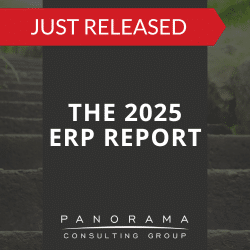- Privacy concerns for using AI in the workplace are growing as employees increasingly use external AI tools that may expose sensitive data and violate compliance standards.
- Employee AI usage policies are essential for preventing data breaches, ensuring regulatory compliance, and guiding responsible use of AI technologies.
- Unauthorized AI applications in business can lead to intellectual property exposure, financial losses, and reputational damage—especially when used without IT oversight.
- Implementing modern ERP systems with data governance features can help detect unauthorized AI use, enforce employee AI usage policies, and address workplace privacy concerns.
Your employees might be sharing your company’s secrets—and they may not even realize it.
The way employees use artificial intelligence (AI) tools matters. Many use cases can jeopardize data privacy, especially when employees use unauthorized AI applications.
Today, we’re discussing the risks of using AI in the workplace and examining why AI usage policies are crucial.
2025 Clash of the Titans
SAP, Oracle, Microsoft, and Infor each have a variety of systems that can support data-driven decision-making. We surveyed customers of these four vendors to find out what their selection and implementation process was like.
AI in the Workplace and Its Privacy Concerns
AI tools are now ubiquitous across industries. From chatbots that enhance customer service to sophisticated data analytics platforms that forecast market trends, employees increasingly rely on AI to increase productivity.
However, the accessibility of free or low-cost AI applications raises critical workplace privacy concerns.
Employees often use these tools without fully understanding how they collect, process, and store data. The truth is, many AI platforms, especially consumer-grade or free versions, retain information submitted by users to improve future responses. These tools often include default settings that permit data to be stored for model training unless users actively opt out.
(By contrast, most enterprise-grade AI providers offer contractual assurances that proprietary data will not be retained or used for model improvements. Organizations using paid, enterprise-level solutions from reputable vendors can often configure strict data privacy settings.)
Allowing employees to use unsanctioned platforms or misconfiguring enterprise platforms can have dire consequences, including:
- Intellectual Property (IP) Exposure: Over time, if multiple companies in the same industry use a particular AI application, the tool’s underlying algorithm might become increasingly familiar with common contractual structures, pricing benchmarks, and negotiation strategies—some of which originated from your data.
- Compliance Concerns: Unauthorized AI use can lead to regulatory violations, exposing companies to fines and legal repercussions. These risks compound when AI applications are layered onto legacy ERP systems that may not have robust integration capabilities or up-to-date security protocols.
- Financial Implications: Data breaches stemming from unauthorized AI usage can trigger not only direct costs—such as legal fees and fines—but also intangible losses, like diminished customer trust and damaged supplier relationships.
Examples of Unauthorized AI Applications Commonly Used in Business
The use of unauthorized AI applications in business is more widespread than many executives realize. Following are some of the most common examples:
1. AI-based file-sharing and collaboration tools (e.g., Dropbox integrations with AI, Notion AI, Slack GPT)
When used within approved company accounts and configured with proper security settings, AI-powered collaboration tools can streamline workflows, improve document organization, and enhance communication—without compromising privacy.
The risk arises, however, when employees enable AI features or third-party plugins without IT oversight. Using personal Dropbox accounts for work files, connecting unauthorized apps in Slack, or activating Notion AI without understanding data handling policies can lead to sensitive information being processed on external servers outside your control.
2. AI-driven customer service chatbots and virtual assistants (e.g., ChatGPT plugins, Zendesk AI)
When implemented under IT governance with encryption protocols and clear data privacy settings, AI chatbots can enhance customer service without exposing sensitive information.
Risky use occurs when chatbots are deployed hastily, without security reviews or compliance checks. If employees integrate external plugins or use free AI chatbot services that process conversations through public cloud environments, then your data may be stored without proper safeguards.
3. AI-enhanced business intelligence (BI) platforms and predictive analytics tools (e.g., Tableau with AI, Power BI Copilot)
Properly configured BI tools with built-in AI capabilities can help organizations analyze internal data securely, generating valuable insights while keeping information centralized and compliant with data governance policies.
Problems arise when employees connect these tools to unauthorized data sources or external platforms without IT approval. Pulling data from personal spreadsheets stored on public drives, integrating third-party AI plugins without security vetting, or exporting sensitive reports to unapproved environments can expose critical information.
The Importance of Employee AI Usage Policies
Executives who view AI adoption solely through the lens of productivity gains may overlook a fundamental risk factor—how employees interact with these tools outside sanctioned IT channels.
We recommend building a cross-functional AI governance committee. This committee should include representatives from IT, legal, HR, and operational teams who meet regularly to assess emerging AI tools, evaluate associated risks, and update company policies.
Employee AI usage policies must extend beyond legal jargon, providing clear guidelines on approved tools, prohibited actions, and the rationale behind these restrictions.
Expert Insight
It’s important to balance compliance with innovation. One way to do this is to implement a “controlled experimentation” program, allowing employees to test new AI tools within a sandbox environment governed by IT. This fosters innovation while ensuring that data privacy protocols are followed and new technologies are properly vetted before wider use.
Vendor Agreements: An Overlooked Layer of Protection
While internal policies are essential for guiding employee behavior, vendor agreements and data processing terms play an equally critical role in protecting company data.
CEOs and business leaders should ensure that contracts with third-party AI providers include clear stipulations on data privacy, retention policies, and compliance with regulations, such as GDPR and CCPA. Reviewing these agreements carefully ensures that sensitive information is handled according to your organization’s privacy standards.
Using ERP negotiation services can help you ensure that vendors provide explicit guarantees against data retention and offer robust audit and security certifications.
How ERP Systems Can Mitigate AI-Related Data Privacy Concerns
Integrating AI into your digital infrastructure doesn’t have to come at the expense of security.
Modern ERP systems, when selected and implemented correctly, can serve as a vital defense mechanism against unauthorized AI applications. In fact, many of the top ERP systems offer built-in data governance tools, enabling organizations to centralize information, enforce access controls, and monitor usage patterns across departments.
For example, we have experience with AI-powered ERP systems that automatically flag attempts to export sensitive data to unauthorized platforms, provide real-time alerts when unusual data activity occurs, and integrate with compliance modules to ensure that AI usage aligns with company policies and regulatory requirements.
However, successfully implementing this software hinges on comprehensive employee training. Organizations must develop training programs that illustrate real-world scenarios where employees might be tempted to bypass protocols and explain the risks these shortcuts create.
Training should also highlight how authorized AI tools, when used within the ERP system, ensure data accuracy, maintain audit trails, and uphold compliance standards.
Learn More About the Privacy Concerns of AI in the Workplace
Every day, employees across the globe input proprietary data to unauthorized AI applications. Identifying and addressing unsanctioned usage is critical for minimizing your company’s exposure to IP risks, compliance issues, and financial losses.
Contact our business software consultants to learn how to navigate the privacy complexities of AI in the workplace without sacrificing innovation.













